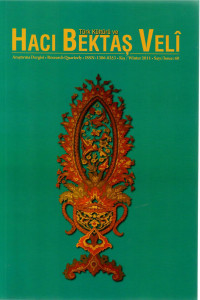Öz
Dil, bir kelimeler yığını değil, insanın duygu, düşünce ve hayal dünyasını paylaşma aracıdır. Bu paylaşımın istenen şekilde gerçekleşebilmesi, kelimelerin, zihinlerde kurduğu dünyanın yani kavramların alıcı için de verici içinde aynı; en azından birbirine yakın olmasına bağlıdır. Düşünen, yorumlayan ve sosyal çevresiyle iletişim kurmak isteyen insan için kelimeler birer temsilcidir. Onların temsil ettiği nesne, anlayış, olay, durum vs. hafızada kayıtlıdır. İnsan, kavram adı verilen bu kayıtları muhatabına kelimeler aracılığıyla iletir. Muhatap da aynı şekilde kelimenin kendi zihnindeki tasarımları çerçevesinde onu anlamlandırır. Bir iletişim sürecinde kullanılan kelimelerin alıcı ile verici zihnindeki tasarımları farklı olursa iletişim gerçekleşmez. Sosyal değerleri temsil eden kelimelerin bireyler tarafından farklı şekillerde kavramlaştırılması ise toplum içinde duygu ve düşünce birliğinin sağlanmasını oldukça zorlaştırır. Çünkü aynı dili kullandığını zanneden insanlar aslında farklı diller kullanırlar. Başka bir deyişle kelimelere farklı değerler yükler; algılama,anlama ve anlatmada bu değerlerin etkisinde kalarak birbirlerini anlayamazlar. Özellikle inanca bağlı kavramlar, inancı yaşayanlarla ona yabancı olanlar arasında düşünce ve yaşayış tarzı bakımından önemli farklılıklar oluşturur. Bugün ülkemizde, değerlerimizi temsil eden kelimeler, çok farklı şekillerde kavramlaştırılıp kullanılmaktadır. Alevilik ve Bektaşilik de toplumumuzda, bireyler ve gruplar tarafından farklı şekillerde kavramlaştırılan kelimelerdendir.
Anahtar Kelimeler
Kaynakça
- AKSAN, Doğan (2006). ANLAMBİLİM Anlambilim konuları ve Türkçenin Anlambilimi, Engin Yayınevi,Ankara.
- AYDIN, Ayhan (2004). Günümüz Alevi Ozanları, Cem Vakfı Yayınları: 9, İstanbul.
- AYTAŞ, Gıyasettin (2010). Alevi Sorununun Çözüm Formülü (Röportaj). Bugün Gazetesi, 25 Ekim 2010 Pazar.
- BAŞER, Sait (2009). “Türk Anlama ve İnanma Modeline Dair” Türk Kimliği Ayvaz Gökdemir’e Armağan-2, Ötüken Neşriyat, İstanbul.
- CEBECİ, Dilâver (2003). Bütün Şiirleri, Ötüken Neşriyat, İstanbul.
- DEVELLİOĞLU, Ferit (1980). Osmanlıca-Türkçe Ansiklopedik Lûgat, Doğuş Matbaası, Ankara.
- Divanü Lûgat-it-Türk Dizini “Endeks” IV (1986). Çeviren: Besim ATALAY, Türk Tarih Kurumu Basımevi, Ankara.
- KAPLAN, Mehmet (1988). Kültür ve Dil, Dergâh Yayınları, İstanbul.
- KARAHAN, Leylâ (2011). “Türkçenin Zenginliği”, Türk Dili Üzerine İncelemeler, Akçağ , Ankara.
- RENÇBER, Fevzi (2010). “40 Soruda Adıyaman’da Geleneksel Alevilik” Türk Kültürü ve Hacı Bektaş Velî, Alevilik Özel Sayısı, 56. Sayı, s.395- 406.
- http: //tdkterim.gov.tr /bts/.
Öz
Language is not a pile of words; it is a tool for sharing one’s feelings, thoughts and imaginations. That being taken place of this sharing as expected depends on that the words, and their world established in people’s mind, in other words, concepts are the same for receiver and transmitter or at least are close to each other. For the person who thinks, interprets and wants to communicate with social environment, the words are representatives. Object, understanding, event, situation, etc. that they represent are registered in the memory. Human passes the records which are named as concept to the interlocutor through the words. Interlocutor gives it a meaning within the framework of designs of the words in his own mind in the same way. Communication does not occur if designs of the words in the mind of receiver and transmitter used in a communication process are different. Conceptualisation of the words that represent social values differently by individuals makes it very difficult to ensure the unity of feeling and thought in the community because people who think that they use the same language actually use different languages. In other words, they loads different values to the words; they cannot understand each other by staying the influence of this values in perception, understanding and explaining. In particular, faith-based concepts create significant differences in terms of style of thinking and way of living between those who live the belief and those who are unfamiliar to this. Today in our country, the words that represent our values are used by conceptualizing in many different ways. Alevism and Bektashism are also the words that are conceptualized in different ways by individuals and groups in our society.
Anahtar Kelimeler
Kaynakça
- AKSAN, Doğan (2006). ANLAMBİLİM Anlambilim konuları ve Türkçenin Anlambilimi, Engin Yayınevi,Ankara.
- AYDIN, Ayhan (2004). Günümüz Alevi Ozanları, Cem Vakfı Yayınları: 9, İstanbul.
- AYTAŞ, Gıyasettin (2010). Alevi Sorununun Çözüm Formülü (Röportaj). Bugün Gazetesi, 25 Ekim 2010 Pazar.
- BAŞER, Sait (2009). “Türk Anlama ve İnanma Modeline Dair” Türk Kimliği Ayvaz Gökdemir’e Armağan-2, Ötüken Neşriyat, İstanbul.
- CEBECİ, Dilâver (2003). Bütün Şiirleri, Ötüken Neşriyat, İstanbul.
- DEVELLİOĞLU, Ferit (1980). Osmanlıca-Türkçe Ansiklopedik Lûgat, Doğuş Matbaası, Ankara.
- Divanü Lûgat-it-Türk Dizini “Endeks” IV (1986). Çeviren: Besim ATALAY, Türk Tarih Kurumu Basımevi, Ankara.
- KAPLAN, Mehmet (1988). Kültür ve Dil, Dergâh Yayınları, İstanbul.
- KARAHAN, Leylâ (2011). “Türkçenin Zenginliği”, Türk Dili Üzerine İncelemeler, Akçağ , Ankara.
- RENÇBER, Fevzi (2010). “40 Soruda Adıyaman’da Geleneksel Alevilik” Türk Kültürü ve Hacı Bektaş Velî, Alevilik Özel Sayısı, 56. Sayı, s.395- 406.
- http: //tdkterim.gov.tr /bts/.
Ayrıntılar
| Birincil Dil | Türkçe |
|---|---|
| Bölüm | Araştırma Makalesi |
| Yazarlar | |
| Yayımlanma Tarihi | 3 Aralık 2011 |
| Yayımlandığı Sayı | Yıl 2011 Sayı: 60 |
Türk Kültürü ve Hacı Bektaş Velî Araştırma Dergisi Creative Commons Atıf-GayriTicari 4.0 Uluslararası Lisansı ile lisanslanmıştır.


